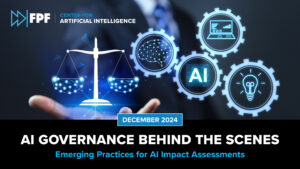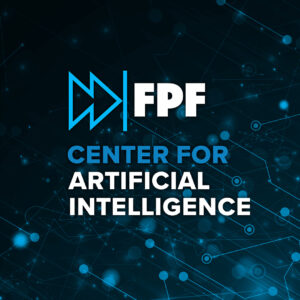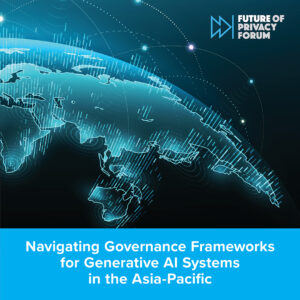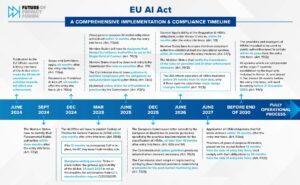The FPF Center for Artificial Intelligence: Navigating AI Policy, Regulation, and Governance
 The rapid deployment of Artificial Intelligence for consumer, enterprise, and government uses has created challenges for policymakers, compliance experts, and regulators. AI policy stakeholders are seeking sophisticated, practical policy information and analysis.
The rapid deployment of Artificial Intelligence for consumer, enterprise, and government uses has created challenges for policymakers, compliance experts, and regulators. AI policy stakeholders are seeking sophisticated, practical policy information and analysis.
This is where the FPF Center for Artificial Intelligence comes in, expanding FPF’s role as the leading pragmatic and trusted voice for those who seek impartial, practical analysis of the latest challenges for AI-related regulation, compliance, and ethical use.
At the FPF Center for Artificial Intelligence, we help policymakers and privacy experts at organizations, civil society, and academics navigate AI policy and governance. The Center is supported by a Leadership Council of experts from around the globe. The Council consists of members from industry, academia, civil society, and current and former policymakers.
FPF has a long history of AI-related and emerging technology policy work that has focused on data, privacy, and the responsible use of technology to mitigate harms. From FPF’s presentation to global privacy regulators about emerging AI technologies and risks in 2017 to our briefing for US Congressional members detailing the risks and mitigation strategies for AI-powered workplace tech in 2023, FPF has helped policymakers around the world better understand AI risks and opportunities while equipping data, privacy and AI experts with the information they need to develop and deploy AI responsibly in their organizations.
In 2024, FPF received a grant from the National Science Foundation (NSF) to advance the Whitehouse Executive Order in Artificial Intelligence to support the use of Privacy Enhancing Technologies (PETs) by government agencies and the private sector by advancing legal certainty, standardization, and equitable uses. FPF is also a member of the U.S. AI Safety Institute at the National Institute for Standards and Technology (NIST) where it focuses on assessing the policy implications of the changing nature of artificial intelligence.
Areas of work within the FPF Center for Artificial Intelligence include:
- Legislative Comparison
- Responsible AI Governance
- AI Policy by Sector
- AI Assessments & Analyses
- Novel AI Policy Issues
- AI and Privacy Enhancing Technologies
FPF’s new Center for Artificial Intelligence will be supported by a Leadership Council of leading experts from around the globe. The Council will consist of members from industry, academia, civil society, and current and former policymakers.
FPF Center for AI Leadership Council
The FPF Center for Artificial Intelligence will be supported by a Leadership Council of leading experts from around the globe. The Council will consist of members from industry, academia, civil society, and current and former policymakers.
We are delighted to announce the founding Leadership Council members:
- Estela Aranha, Member of the United Nations High-level Advisory Body on AI; Former State Secretary for Digital Rights, Ministry of Justice and Public Security, Federal Government of Brazil
- Jocelyn Aqua, Principal, Data, Risk, Privacy and AI Governance, PricewaterhouseCoopers LLP
- John Bailey, Nonresident Senior Fellow, American Enterprise Institute
- Lori Baker, Vice President, Data Protection & Regulatory Compliance, Dubai International Financial Centre Authority (DPA)
- Cari Benn, Assistant Chief Privacy Officer, Microsoft Corporation
- Andrew Bloom, Vice President & Chief Privacy Officer, McGraw Hill
- Kate Charlet, Head of Global Privacy, Safety, and Security Policy, Google
- Prof. Simon Chesterman, David Marshall Professor of Law & Vice Provost, National University of Singapore; Principal Researcher, Office of the UNSG’s Envoy on Technology, High-Level Advisory Body on AI
- Barbara Cosgrove, Vice President, Chief Privacy Officer, Workday
- Jo Ann Davaris, Vice President, Global Privacy, Booking Holdings Inc.
- Elizabeth Denham, Chief Policy Strategist, Information Accountability Foundation, Former UK ICO Commissioner and British Columbia Privacy Commissioner
- Lydia F. de la Torre, Senior Lecturer at University of California, Davis; Founder, Golden Data Law, PBC; Former California Privacy Protection Agency Board Member
- Leigh Feldman, SVP, Chief Privacy Officer, Visa Inc.
- Lindsey Finch, Executive Vice President, Global Privacy & Product Legal, Salesforce
- Harvey Jang, Vice President, Chief Privacy Officer, Cisco Systems, Inc.
- Lisa Kohn, Director of Public Policy, Amazon
- Emerald de Leeuw-Goggin, Global Head of AI Governance & Privacy, Logitech
- Caroline Louveaux, Chief Privacy Officer, MasterCard
- Ewa Luger, Professor of human-data interaction, University of Edinburgh; Co-Director, Bridging Responsible AI Divides (BRAID)
- Dr. Gianclaudio Malgieri, Associate Professor of Law & Technology at eLaw, University of Leiden
- State Senator James Maroney, Connecticut
- Christina Montgomery, Chief Privacy & Trust Officer, AI Ethics Board Chair, IBM
- Carolyn Pfeiffer, Senior Director, Privacy, AI & Ethics and DSSPE Operations, Johnson & Johnson Innovative Medicine
- Ben Rossen, Associate General Counsel, AI Policy & Regulation, OpenAI
- Crystal Rugege, Managing Director, Centre for the Fourth Industrial Revolution Rwanda
- Guido Scorza, Member, The Italian Data Protection Authority
- Nubiaa Shabaka, Global Chief Privacy Officer and Chief Cyber Legal Officer, Adobe, Inc.
- Rob Sherman, Vice President and Deputy Chief Privacy Officer for Policy, Meta
- Dr. Anna Zeiter, Vice President & Chief Privacy Officer, Privacy, Data & AI Responsibility, eBay
- Yeong Zee Kin, Chief Executive of Singapore Academy of Law and former Assistant Chief Executive (Data Innovation and Protection Group), Infocomm Media Development Authority of Singapore
For more information on the FPF Center for AI email [email protected]
Featured
Annual DC Privacy Forum: Convening Top Voices in Governance in the Digital Age
FPF hosted its second annual DC Privacy Forum: Governance for Digital Leadership and Innovation on Wednesday, June 11. Staying true to the theme, this year’s forum convened key government, civil society, academic, and corporate privacy leaders for a day of critical discussions on privacy and AI policy. Gathering an audience of over 250 leaders from […]
FPF Experts Take The Stage at the 2025 IAPP Global Privacy Summit
By FPF Communications Intern Celeste Valentino Earlier this month, FPF participated at the IAPP’s annual Global Privacy Summit (GPS) at the Convention Center in Washington, D.C. The Summit convened top privacy professionals for a week of expert workshops, engaging panel discussions, and exciting networking opportunities on issues ranging from understanding U.S. state and global privacy […]
Chatbots in Check: Utah’s Latest AI Legislation
With the close of Utah’s short legislative session, the Beehive State is once again an early mover in U.S. tech policy. In March, Governor Cox signed several bills related to the governance of generative Artificial Intelligence systems into law. Among them, SB 332 and SB 226 amend Utah’s 2024 Artificial Intelligence Policy Act (AIPA) while […]
Twelve Privacy Investments for Your Company for a Stronger 2025
FPF has put together a list of Twelve Privacy Investments for Your Company for a Stronger 2025 that reflects on new perspectives on the work that privacy teams do at their organizations. We hope there is something here that’s useful where you work, and we’d love to hear other ideas and feedback. Privacy Investments for Your […]
FPF’s Year in Review 2024
With contributions from Judy Wang, Communications Intern 2024 was a landmark year for the Future of Privacy Forum, as we continued to grow our privacy leadership through research and analysis, domestic and global meetings, expert testimony, and more – all while commemorating our 15th anniversary. Expanding our AI Footprint While 2023 was the year of […]
Five Big Questions (and Zero Predictions) for the U.S. State Privacy Landscape in 2025
In the enduring absence of a comprehensive national framework governing the collection, use, and transfer of personal data, state-level activity on privacy legislation has been on a consistent upward trend since the enactment of the California Consumer Privacy Act in 2018. With all 50 U.S. states scheduled to be in session in 2025, stakeholders are […]
U.S. Legislative Trends in AI-Generated Content: 2024 and Beyond
Standing in front of the U.S. flag and dressed as Uncle Sam, Taylor Swift proudly proclaims that you should vote for Joe Biden for President. She then wants you to vote for Donald Trump in a nearly identical image circulated by former President Trump himself. Both the images, and the purported sentiments, are fabricated, the […]
Do LLMs Contain Personal Information? California AB 1008 Highlights Evolving, Complex Techno-Legal Debate
By Jordan Francis, Beth Do, and Stacey Gray, with thanks to Dr. Rob van Eijk and Dr. Gabriela Zanfir-Fortuna for their contributions. California Governor Gavin Newsom signed Assembly Bill (AB) 1008 into law on September 28, amending the definition of “personal information” under the California Consumer Privacy Act (CCPA) to provide that personal information can […]
Updated February 25, 2025: FPF no longer coordinates the Multistate AI Policymaker Working Group
Updated February 25, 2025: FPF no longer coordinates the MAP-WG. Please read here for more information. Future of Privacy Forum Convened Over 200 State Lawmakers in AI Policy Working Group Focused on 2025 Legislative Sessions The Multistate AI Policymaker Working Group (MAP-WG) was convened by FPF to help state lawmakers from more than 45 states […]
Synthetic Content: Exploring the Risks, Technical Approaches, and Regulatory Responses
Today, the Future of Privacy Forum (FPF) released a new report, Synthetic Content: Exploring the Risks, Technical Approaches, and Regulatory Responses, which analyzes the various approaches being pursued to address the risks associated with “synthetic” content – material produced by generative artificial intelligence (AI) tools. As more people use generative AI to create synthetic content, […]




















